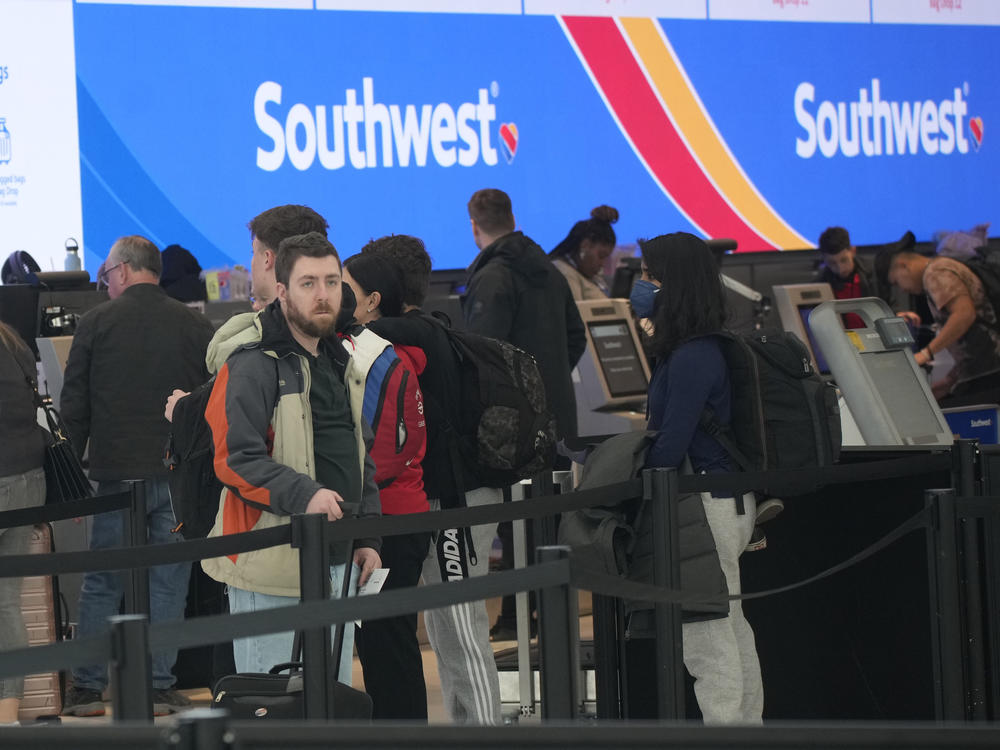Section Branding
Header Content
Southwest's COO will tell senators 'we messed up' over the holiday travel meltdown
Primary Content
One of Southwest Airlines' top executives will appear before a Senate committee Thursday to discuss the company's holiday meltdown and deliver a clear message to the public: "we messed up."
According to written testimony obtained by NPR, Chief Operating Officer Andrew Watterson will again apologize for the December debacle that saw 16,700 flights canceled across the U.S. and attempt to explain what exactly caused the crisis at one of the country's largest carriers.
Officials have said a combination of severe winter weather, staffing shortages and technological issues led to cancellations and delays that left people stranded in airports across the nation and unable to travel for the holidays.
But it's unclear why Southwest performed so badly even as other airlines rebounded from the storm.
The fiasco prompted a wave of blowback from fliers and employees, sparked a Department of Transportation investigation and cost the company as much as $825 million.
Now, Southwest says it's conducting an internal review of what went wrong and is vowing to make it up to customers. Watterson is offering a detailed account of the meltdown as he prepares to speak in a hearing before the Senate Commerce Committee.
Worse-than-expected winter weather led to staffing issues
According to Watterson's prepared testimony, the major winter storm on Dec. 21 was far worse than airline officials had expected, forcing Southwest to cancel almost all of its flight schedule for several days in Denver and Chicago — its two largest stations.
A quarter of all Southwest flight crews begin and end their stints at those two airports, and the cancellations there had impacts on flights elsewhere. Meanwhile, the storm was moving east and besieging other airports with similar problems.
Communication among Southwest operations centers quickly broke down and led to "compounding, frequent, close-in flight cancellations" rather than advanced cancellations with more notice to travelers.
Crew schedulers couldn't keep up with the domino effect of flight cancellations, and without up-to-date schedules, Southwest's crew scheduling software couldn't reassign crews to understaffed flights.
Ultimately, "the disruption primarily revealed a need to add functionality" to the to our Crew Scheduling software to solve for a large backlog of broken Crew pairings," Watterson says in the prepared remarks.
The company ultimately decided to "pre-cancel" two-thirds of its flights from Dec. 27-29 in order to reset operations and get back to its normal schedule by Dec. 30.
Southwest embarks on a quest of internal reflection — and third-party guidance
For 2023, Watterson says Southwest has budgeted to spend $1.3 billion of the company's annual operating plan on investments, upgrades, and IT systems maintenance plans.
He also touts several mitigation efforts that he says are already in the works, including improvements to electronic communication tools between crews and crew scheduling teams — a key point of weakness during the travel meltdown.
Operational staff has also been bolstered to help support crew recovery efforts "at the first sign of a potential backlog."
And the carrier has added more flights in 2023, which officials say will make it easier to re-book customers if and when flights are disrupted because of bad weather or other issues.
Southwest is also looking for outside advice.
Watterson says the airline has hired Oliver Wyman, a management consultancy firm, to make recommendations on how to improve performance on bad weather days, among other areas. The two reviews will dictate "what sequence of improvements is most appropriate in terms of supporting our Customers, Employees, and technology infrastructure."
The airline plans to address each person's request from the meltdown
The COO ends his written testimony by noting the steps Southwest has taken for the thousands of customers who were affected by the unprecedented flight cancellations.
Southwest has spent hundreds of millions of dollars granting all "reasonable" reimbursement requests for customer's out-of-pocket expenses, including hotels, rental cars and meals. And, as a gesture of goodwill, the airline has also given customers 25,000 Rapid Rewards points — roughly a $300 value, according to the comments. Bags and luggage were returned to their rightful owners, in some cases with the assistance of outside vendors.
"These actions go above and beyond applicable DOT requirements relating to airline refunds and baggage and travel expense reimbursements for flights cancelled or significantly delayed by an airline," Watterson says. "It has truly been an all-hands-on-deck effort, and our People will not let up until all requests are complete."
Copyright 2023 NPR. To see more, visit https://www.npr.org.

